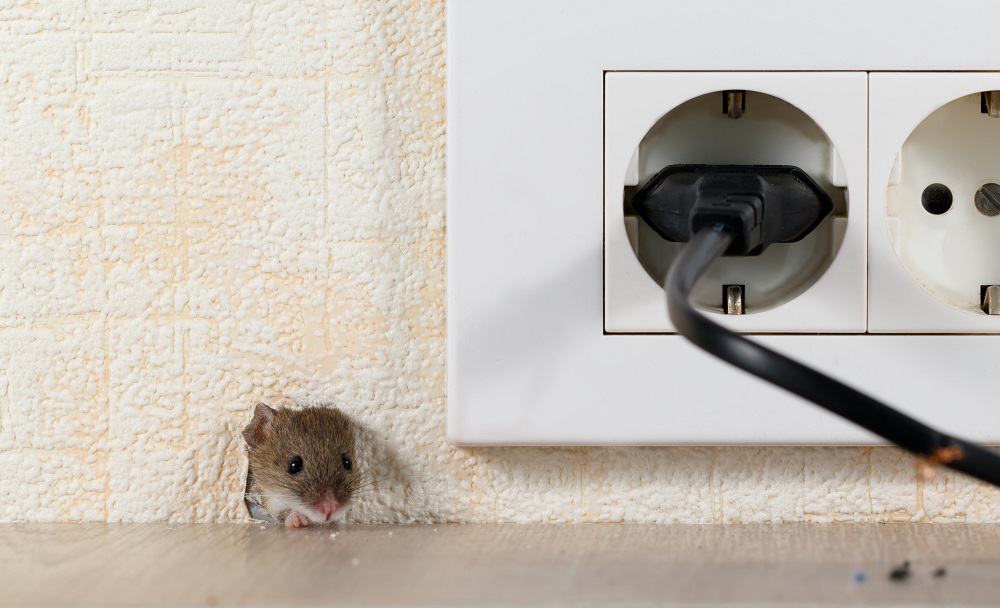Mice (Mus musculus) constitute a significant portion of rodent problems experienced around the world. There are numerous reasons why mice have to be controlled; They carry a wide variety of diseases such as leptospirosis and Salmonella. Mice can also cause extensive damage to personal property and can ruin stored food. While there are numerous ways of dealing with mice, many of those methods can also potentially harm non-target organisms such as pets. Thus, it is important for pet owners to be familiar with ways to remove mice pests without harming their pets.
There are a few ways to effectively remove mice without potentially harming pets. Numerous sources cite that the first action is to mouse-proof the house. Mouse-proofing the house can prevent mice infestations from occurring in the first place. However, if mice are already present, then the safest way to get rid of them is through the use of natural repellents – substances that can irritate or repel mice from an area. Many of these natural repellents are made from plant-based substances such as natural oils. However, predator urine (synthetic) has also shown considerable effectiveness.
Table of Contents
The Dangers of Certain Pest Control Methods to Pets
Pets are beloved members of the household. However, they can inadvertently be harmed by pest control methods that were targeted for mice instead. This is a common problem, especially with pest control methods that aim to attract attention.
While this can be harmful to some pets, some methods can even be lethal. This is particularly true for cases of using poisonous pellets that can appear to be a snack to a dog or cat (1). Aside from being designed to look like snacks, some poisonous pellets are even designed to be somewhat palatable. This is not only dangerous to pets but also to small children as well.
Even if the poisons are placed out of reach of pets, the mice that die from the poisons (primary poisoning) can still harm pets through secondary poisoning. This is when a pet eats a mouse that has also ingested the poison. This is especially problematic as the poison is slow acting which means that the mouse can still live about a day or two after ingesting the poison. While the poisoned mouse is still moving around the house, a pet cat can unknowingly prey on this mouse.
Even the traditional spring-loaded mousetrap cannot be considered safe to use around pets because curious pets can get their snouts or paws injured by the mechanism of the trap. This methods is also not a humane means of pest control.
Another common type of pest control used to remove mice is the use of mouse trap glue. This type of control comes in the form of glue paper and glue boards. This is also not considered a safe option in a household with pets (2). Larger pets may be able to free themselves while losing some amount of fur. However, smaller pets may need professional assistance from a veterinarian to be freed from a glue trap. Again, this method is also not humane.
It may seem difficult to find pest control methods that can specifically target mice without harming pets. However, there are some methods that can be used.
Mouse-Proofing

One of the best ways to control mice infestations is to prevent them from happening in the first place. As the common adage goes, “prevention is better than cure.” Mouse-proofing the house is the best way to prevent mice pests from arriving and to protect pets from them as well.
The first objective when it comes to mouse-proofing is to check the food stores. Mice only infest houses that serve as a food source. Without a food source, the mice will be deprived and will have to find a different place to go.
Once the food stores are secured, the next step to prevent mice from entering the home is to identify potential entry points into the living space. The CDC (Centers for Disease Control and Prevention) suggests looking for holes and gaps both inside and outside the home (3). These include around kitchen cabinets, refrigerators, and stoves, around doors, around fireplaces, around the pipes under sinks and washing machines, around vents, inside attics, in the basement, around windows, and around holes for electrical, plumbing, cable, and gas lines.
Mice can enter holes as small as the size of nickels. With the potential entry points identified, the holes should be covered up. Large holes might need materials such as lath screens, lath metal, metal sheeting, cement, or hardware cloth. On the other hand, smaller holes can be dealt with by filling them with steel wool and fixing the steel wool in place with caulking.
Natural Repellents
If a mouse infestation is currently present, alternative methods would have to be considered. One of the best ways to control mice without potentially harming pets is by using natural repellents. These are natural substances that contain certain scents that can irritate mice, causing them to leave the premises.
There are several natural substances that have been observed to have repellent properties against mice.
A 2016 systematic review published in the Journal of Chemical Ecology looked at several papers published on plant-based repellents on rodent pests (4). It specifically discusses certain plant substances that have been found to have an effect on mice such as capsaicin, bergamot oil, buchu oil, and fennel oil.
These substances can be made into a liquid solution that can simply be sprayed into an area that is infested with mice. The solution can also be sprayed at potential points of entry to prevent re-entry.
Other sources also cite other substances such as peppermint oil, pepper, and cloves. After mixing all the different substances into one solution, others also suggest using the liquid to saturate cotton balls that can be left around areas in the house that are prone to mice infestations such as cabinets and cupboards.
Another repellent that has been suggested to work on mice is urine – specifically urine that comes from common predators - or has been synthetically manufactured. There are several sources for purchasing predator urine online and studies to back up the science behind it (5, 6).
These studies show that mice are highly receptive to the scent of urine from predators such as cats and wolves. Upon detecting the scent, scientists were able to observe fear-associated behaviors in mice such as freezing and avoidance. It was even found that mice instinctively respond to these scents since the experiments used mice that were bred in labs without ever encountering these predators in real life.
References
2. https://www.humanesociety.org/



